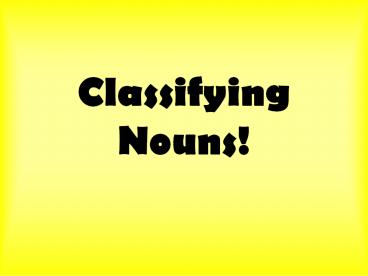Classifying Nouns! - PowerPoint PPT Presentation
1 / 21
Title:
Classifying Nouns!
Description:
Classifying Nouns! The Categories Once we figure out which words are being used as nouns, we have to figure out what kind of nouns they are. Nouns can be categorized ... – PowerPoint PPT presentation
Number of Views:642
Avg rating:3.0/5.0
Title: Classifying Nouns!
1
Classifying Nouns!
2
The Categories
- Once we figure out which words are being used as
nouns, we have to figure out what kind of nouns
they are. - Nouns can be categorized as
- common OR proper
- singular OR plural
- concrete OR abstract
- collective
- possessive
3
Singular v. Plural
- Singular means that there is only ONE of
something, just like when you pay in singles,
you pay in 1 bills. Likewise, if you are
single on Facebook, you are alone! (Wuamp
wuamp) - Plural means there are MORE THAN ONE. Plural
nouns often end in s, but not always!
Foot
Feet
4
WHITE BOARDS OUT! (Level 0) 54321
5
Singular v. Plural
singular! singular! plural! singular! singular! pl
ural! plural! singular!
Group Foot Penguins City Shoe Books Teeth
Class
6
Common v. Proper
- A common noun is a general name for a person,
place, thing, or idea. They are usually NOT
capitalized - Unless they are placed at the beginning of a
sentence of course! - A proper noun is a particular person, place,
thing, or idea. It is ALWAYS capitalized.
7
Common v. Proper
common! proper! common! common! proper! proper! p
roper!...and the best city of all time!
City Ohio Museum Teacher Survey of
Literature Halloween Cleveland
8
Concrete v. Abstract
- Concrete nouns are nouns that can be perceived by
the senses, which means they can be seen,
touched, tasted, smelled, or heard. - Hint The way I remember this is that concrete
(the stuff that makes sidewalks) can be seen and
touched. - Abstract nouns are the idea nouns. They are
concepts in the mind, but not something that can
be detected with the senses. - For example We cant say, The hatred came into
the room and sat down. We cant see hatred
itself. We can only see things that result from
hatred, like a mean face. However, then were
looking at a face (concrete), not the actual
hatred.
9
Concrete v. Abstract
concrete! concrete! abstract! abstract! concrete!
abstract! concrete! concrete!
Song Light Uncertainty Independence Monster
Impatience Cleveland Soil
10
Possessive
- Possessive nouns show ownership. This is most
easily recognized by the use of an apostrophe. - Because of this trick, you should be able to look
at a sentence and immediately identify if it has
any possessive nouns! Just look for the
apostrophe! - Beware of contractions Its, couldnt, wont,
etc.
11
Possessive v. Contraction
contraction! contraction! possessive! (unless
boy is) possessive! contraction! contraction! po
ssessive! (unless) contraction!
Wasnt Couldnt Boys Desks Weve Whos Te
achers Im
12
Plural Possessive v. Singular Possessive
- Why does the apostrophe sometimes come before the
s (s) and sometimes after it (s)? - This is how to differentiate plural v. singular
possessives. - The trick to determining this is to cover up the
apostrophe and everything after it. If the word
that is left is singular, its singular
possessive, and vise versa.
13
Possessive
- dogs bowl singular or plural possessive?
- One dog Singular!
- trees leaves singular or plural possessive?
- Two trees Plural!
- brothers ideas singular or plural possessive?
- Two brothers Plural!
14
Collective
- A collective noun is a singular noun that refers
to a group of people or things (represents a
plural concept). - Remember, a noun is singular if you can put the
word one in front of it! - For example band, choir, crew, class, herd,
gaggle, staff, flock, gang, swarm
15
Lets Practice Classifying Nouns! Wahoo!
- Train
- common or proper?
- singular or plural?
- concrete or abstract?
- collective?
- possessive?
No.
No.
16
Kittens common or proper? singular or
plural? concrete or abstract? collective? possessi
ve?
No.
17
Chicago common or proper? singular or
plural? concrete or abstract? collective? possessi
ve?
No.
No.
18
Hope common or proper? singular or
plural? concrete or abstract? collective? possessi
ve?
No.
No.
19
Choirs common or proper? singular or
plural? concrete or abstract? collective? possessi
ve?
20
Why Does it Matter?
- Understanding how to classify nouns helps us
understand the grammatical rules about the
different types (possession, capitalization,
pluralization, subject/verb agreement, etc.). - Improves the quality of our writing!
- Concrete is always preferred.
- Can articulate ideas clearly and accurately!
21
The End!
or is it?































